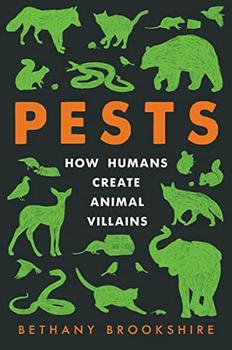Summary | Excerpt | Reviews | Beyond the Book | Readalikes | Genres & Themes | Author Bio

How Humans Create Animal Villains
by Bethany Brookshire
He never even tasted one. Neither did I. It turns out I'm such a bad gardener I can't even keep a jalapeño pepper alive.
Many of my friends have heard the story of F***ing Kevin. Neighbors know about him; we now call every squirrel in the neighborhood by his name. Most people think it's a silly story of my own incompetence and a squirrel's resourcefulness.
It's also the story of a pest. To other people, Kevin is a simple squirrel, perhaps a little smarter than your average rodent. He's cute, fluffy, possibly even sweet.
To me, Kevin is a constant headache. He makes me feel powerless and foolish. What kind of sciency person, what kind of adult must I be that I can't keep a squirrel away from my tomatoes? Every dead green orb seems to judge me, a silly suburbanite who can't keep a garden alive. And it's all because of F**king Kevin.
I have looked up the average life span of an adult squirrel (six years, give or take two or three), and every year I cross my fingers that this is his last. Maybe this spring he'll come down with mange. Maybe he'll eat himself to death on my tomatoes. Or maybe I'll break and buy a BB gun.
Kevin is evidence of my inability to control my environment. When we are observing squirrels through the safety of our camera lens, when we have nothing they want, they are adorable wildlife. When they have the temerity to nest in our chimneys, move into our attics without paying rent, or use our gardens as an all-you-can-eat buffet, it's another story.
Squirrel intrusions into our lives are also indicators of animal success. Species of squirrel hang out on every continent except Antarctica (a group of squirrels, by the way, is called a scurry or a dray). From an original diet of nuts and seeds, they've expanded to French fries and bacon. They're one of the few mammals on the planet that can go down a vertical surface headfirst. Most are scatter hoarders—burying caches of food for the lean times in winter. They have highly accurate spatial memories and can pinpoint exactly where they left precious nuts months after hiding them. I have to have someone call my phone at least once a week because I can't remember where I left it.
I admit it. I'm impressed.
Urban charmer or suburban menace? Squirrels are both. Their status doesn't depend on their behavior. They're just trying to live their best squirrel lives. Instead, whether a squirrel is cute or a curse depends on how we see them.
In some places—such as in Scotland—squirrels have gone from persecuted pest to a source of national pride. There, the red squirrel (Sciurus vulgaris) is native to the woods and glens. The scientific name might be vulgaris, meaning "common," but it doesn't look it. The red squirrel's tufted ears, white tummy, and fluffy tail inspired Beatrix Potter's The Tale of Squirrel Nutkin and provided the pattern for thousands of stuffed squirrel toys the world over.
The red squirrel's history in Scotland has been filled with ups and downs, says Matthew Holmes. A historian of science at the University of Cambridge in England, Holmes has tracked the history of human opinion on animals such as squirrels and sparrows. At first, he explains, forests weren't primarily seen as habitat. People didn't view a forest as a place where things lived, unless they wanted to hunt those things. Instead, forests were trees, and trees were wood to be used in shipbuilding, fires, and more. But as people cut down the local forests, the things in them ran out of places to call home. The red squirrel, which spends most of its time in the trees, began to disappear. By the end of the eighteenth century, no fluffy red tails were to be seen in most of Scotland.
The squirrel was saved in Scotland not by conservationists, but by aristocratic fashion. Around 1778, Elizabeth Scott, Duchess of Buccleuch, saw some red squirrels on her English lands and decided that she had to have them back in Scotland. She wasn't alone. Other aristocrats felt the same—the squirrels went well with the artfully disheveled deer parks they were building on their estates. The lords and ladies weren't necessarily inspired by a charitable sense of conservation—that idea didn't really exist yet. The aristocrats just liked the look of the landscaping—and the money it could bring in from hunting tourism in their new parks. As rich people were more and more able to separate themselves from the worst the wild could send, it became much easier to appreciate its beauty. They brought back squirrels and their habitat in their new enthusiasm for nature.
Excerpted from Pests by Bethany Brookshire. Copyright © 2022 by Bethany Brookshire. Excerpted by permission of Ecco. All rights reserved. No part of this excerpt may be reproduced or reprinted without permission in writing from the publisher.
When a true genius appears in the world, you may know him by this sign...
Click Here to find out who said this, as well as discovering other famous literary quotes!
Your guide toexceptional books
BookBrowse seeks out and recommends the best in contemporary fiction and nonfiction—books that not only engage and entertain but also deepen our understanding of ourselves and the world around us.